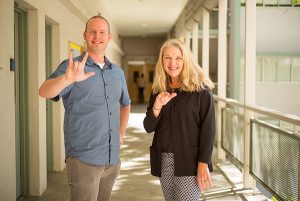
Dr. Peg Hughes and Everett Smith pose for a photograph at Sweeney Hall at San Jose State University on Wednesday, Sept. 27, 2017. (James Tensuan/San Jose State University)
By Jason McMonagle
Many people spent the summer months on adventures trekking up to Mount Kilimanjaro, lounging on the French Riviera, or taking day trips to Bolinas, the small surfing town on California’s coast. Dr. Peg Hughes, chair of the Special Education Department and coordinator of Early Childhood Special Education Programs, and Everett Smith, lecturer and Communication Studies graduate student, spent their summers reviving the four courses that make up the Deaf Minor.
When asked about the inspiration to bring back the Deaf Minor after it has been absent from campus for over a decade, Dr. Hughes pointed out that the College of Education never wanted to lose the courses.
“We used to have a Deaf and Hard of Hearing Teaching Credential and Deaf Minor. The classes had low enrollment because they’re specialized and not everybody wants to be a Deaf special education teacher. We were committed to keeping them, but when the professor with expertise in that area left the university we didn’t rehire,” Dr. Hughes said.
Without a professor fluent in American Sign Language (ASL) and adept in Deaf culture, the Deaf Minor lay dormant for over ten years. It was brought back into Dr. Hughes’s focus when she performed a routine observation on one of Everett Smith’s classes. Smith, a member of the Deaf community, came to San José State in Fall 2016 as a lecturer and graduate student. Currently, he teaches beginning and intermediate American Sign Language courses.
“The interpreter [interpreting Everett’s lecture for Dr. Hughes] asked me after class what had happened to the Deaf Minor because she had a lot of people interested,” Dr. Hughes said and then laughed. “The light bulb went off. I was looking at Everett, and he was so awesome, and I thought let’s just bring it back.”
Dr. Hughes arrived at San José State in 1999 as a professor and to develop the Early Childhood Special Education Credential Program.
“Since then I’ve developed several programs and minors. I wasn’t here long before I got the reputation of being a program developer,” Dr. Hughes said and added, “I am a self-described developer.”
With her experience and acknowledgment that she enjoys the process of creation from blank slate to fully developed program, Dr. Hughes was the perfect candidate to re-establish the minor.
She took her vision to the College of Education’s Interim Dean Paul Cascella, who has a Ph.D. in Special Education and a Master of Arts in Speech-Language Pathology.
“[Interim Dean] Paul signs too,” Dr. Hughes said. “He totally supported the idea. We both immediately thought Everett would be perfect to help update the curriculum from the previous minor and design one of its new courses: Introduction to Deaf Culture.”
Dr. Hughes and Smith tackled the process which involved hours of paperwork, documentation, and editing and developing new curriculum.
The Deaf Minor officially started Fall 2017 and consists of four courses: (EDSE 14A and 14B) Beginning and Intermediate level American Sign Language; (EDSE 102) Speech, Language, & Typical/Atypical Development; and (EDSE 115) Introduction to Deaf Culture.
A tenured or tenure-track faculty member will teach EDSE 102, but Smith will continue teaching the two ASL courses. Additionally, he will teach the class he developed, Introduction to Deaf Culture, when it launches in Spring 2018. The course is an introduction to American Deaf Culture and analyzes the identities, contributions, and experiences of Deaf people and how they are understood within the culture of hearing as well as examining the history, diversity, and evolution of Deaf culture.
“It is unusual for a Chair to ask a lecturer to develop a course,” Dr. Hughes said, highlighting Smith’s skill as a teacher. “Usually tenure-track folks do it because it’s a very high-level professional process. I knew that I could give Everett support and the tools he needed, but I couldn’t conceptualize it the way he could. He’s a dynamic teacher.”
Smith was gracious about Dr. Hughes and Interim Dean Cascella’s confidence in his ability to engage students as a lecturer and to provide San José State University with an academic experience of Deaf Culture and Deaf people.
“As a person in the Deaf culture, this course has helped me so much at getting a better understanding of my own culture,” Smith said. “Going through past curriculum and the course’s textbook it helped me to see why we [the Deaf community] do the things we do. It was also interesting to really understand the role of interpreters in our culture.”
Both Dr. Hughes and Smith felt passionate about providing more opportunities to raise community awareness on the experiences of Deaf people and to embolden Deaf culture as equal and as important as any other culture. The pair spoke about out the absence of Deaf culture in public schools, and how it’s often alarmingly left out of special education.
Smith commented on the importance of teaching ASL to deaf and hard of hearing children. He said, “In my opinion, one of the most pressing issues that affect the Deaf community is the inclusion of sign language and cultural awareness in the education of Deaf people, especially the children. Instruction in sign language at the earliest age ensures that Deaf and even hard of hearing children are not deprived of a language and allows them to develop in other areas in accordance with their unique capabilities.”
Dr. Hughes hopes the Deaf Minor will gain popularity on campus and plans to suggest Special Education graduate students take the courses as a way to advance their skills and knowledge of the field.